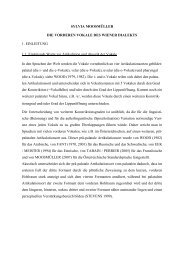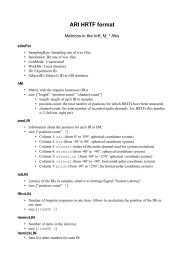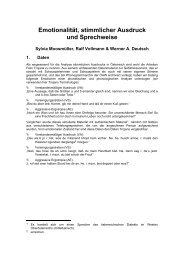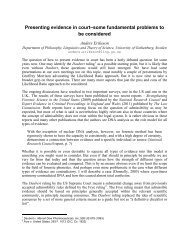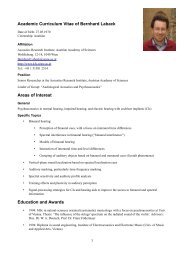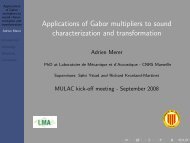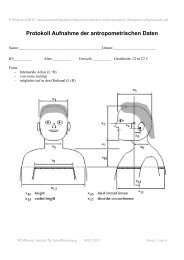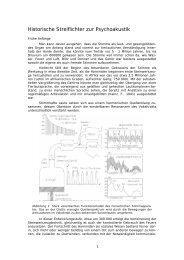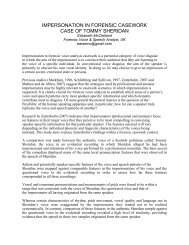VOWELS IN STANDARD AUSTRIAN GERMAN - Acoustics ...
VOWELS IN STANDARD AUSTRIAN GERMAN - Acoustics ...
VOWELS IN STANDARD AUSTRIAN GERMAN - Acoustics ...
Create successful ePaper yourself
Turn your PDF publications into a flip-book with our unique Google optimized e-Paper software.
Sylvia Moosmüller<br />
“nejemi” to one syllable [nE$m], articulating all three syllables would have easily<br />
compensated for the missing 60 ms. Providing an unstressed sequence with the same<br />
articulatory accuracy is, however, in contrast to the principle of backgrounding and<br />
foregrounding. Therefore, an exact timing is of secondary relevance. The primary<br />
concern in the rhythm of speech is to properly background unstressed sequences in<br />
order to contrast them with the stressed positions. How much time is required for the<br />
accomplishment of this activity, depends on the content that has to be conveyed. And<br />
the syntax and semantics of a language do not necessarily consider that a required<br />
amount of unstressed syllables is available in order to fit an exact timing, or, to put it<br />
another way, a speaker of a language plans the sequences of words he or she wants to<br />
utter and the processes that have to be applied, but the speaker does not search for<br />
another word with, e.g., more consonant clusters in order to arrive at an exact timing.<br />
Therefore, speaking is different from walking, dancing, playing an instrument, or<br />
even poetic rhythm, in that it is to a larger extent a social activity. Speakers want or<br />
have to convey in some way or other more and less important units 151 of speech, and<br />
they convey these units in a graded way of foregrounding or backgrounding them. In an<br />
utterance, not only important and non-important information exists, but also further<br />
levels of importance, new information, redundant information, repetitions, etc.<br />
Therefore, in an analysis of the rhythm of speech, dichotomous conceptualizations have<br />
to be given up. Moreover, it has to be questioned whether speaking is really ruled by<br />
timing or whether there is some sort of interaction between what a speaker wants to say,<br />
the speech situation 152 he or she is in, and the time he or she computes or has at his or<br />
her disposal for the planned utterance. Therefore, the gradings of foregroundings and<br />
backgroundings might differ considerably in dependence of diverse external factors.<br />
151<br />
Unit has a broad meaning here and can be new or old information, a phrase, a word, a<br />
syllable, or a phoneme.<br />
152<br />
For example, in an oral exam situation, a speaker might exhibit a different rhythmic<br />
patterning than in an oral presentation, although the amount of time they have at their<br />
disposal might be the same.<br />
226



